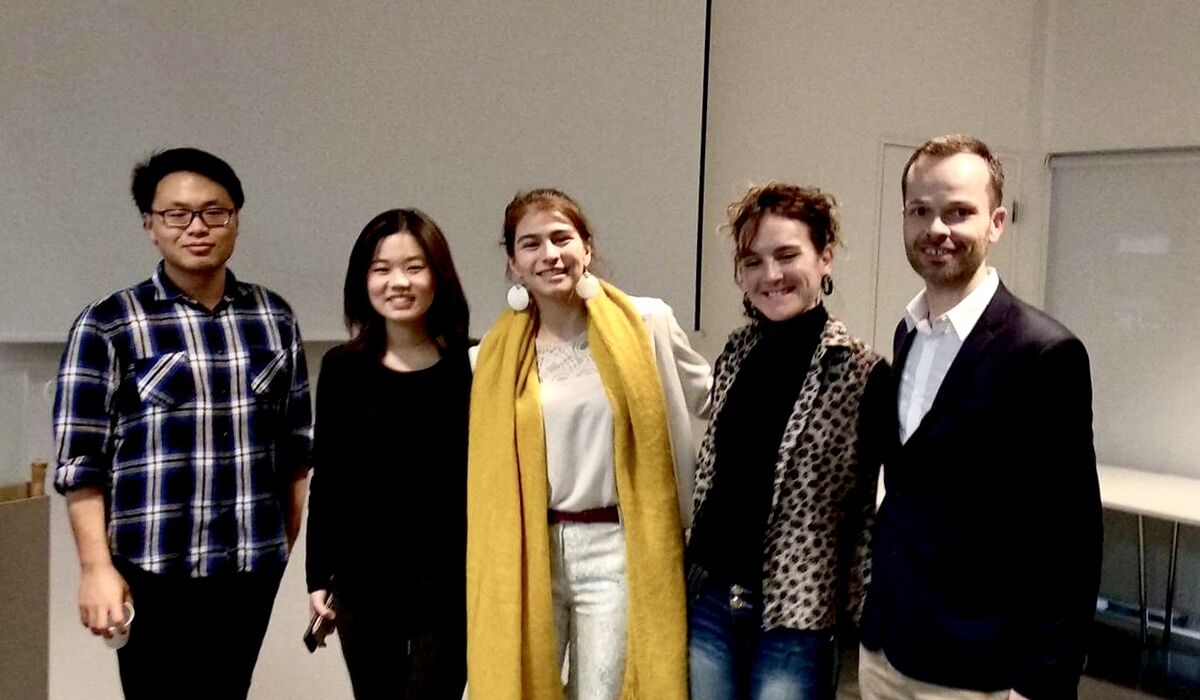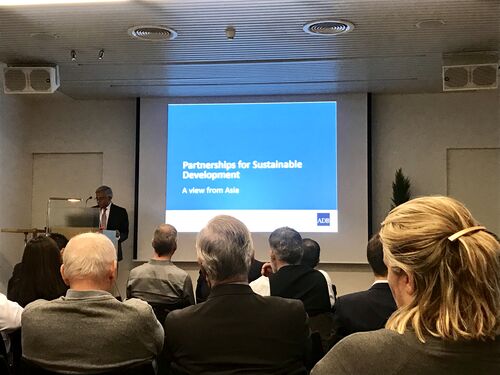Master Students and Alumnus Represented ISE in a Conference at the Icelandic National Energy Authority (Orkustofnun)
Master Students and Alumnus Attended the "Global Implementation of Geothermal Energy and the Role of Asian Development Bank" Conference Held by Orkustofnun
REYKJAVIK, March 30 - Last Thursday, ISE students, Evelyn Gunawan, Nataly Castillo-Ruiz and Scherezade Martos, and ISE alumnus, Miao Yu represented ISE at the “Global Implementation of Geothermal Energy and the Role of Asian Development Bank” conference held by the Icelandic National Energy Authority (Orkustofnun). The event was held following the previous day's signing ceremony of a total of $250 million in loans provided by the Asian Development Bank (ADB) for a landmark project developed by Arctic Green Energy Corporation (AGE) from Iceland and Sinopec Green Energy Geothermal Company Limited (SGE) based in China, to expand the sustainable geothermal district heating network in the People's Republic of China (PRC).

The conference was attended by various company leaders as well as students from ISE and the UNU-GTP (United Nations University-Geothermal Training Program). The first speaker was Gudni A. Jóhannesson, the Director General of Orkustofnun. In his talk, Dr. Jóhannesson introduced the audience to renewable energy usage for power and heating purposes in Iceland. Due to Iceland's geological location, the country is blessed with high number of volcanoes, which makes widespread geothermal energy utilisation a possibility. Currently, renewable energy powers almost 100% of the nation's electricity production, with around 73% from hydropower and 27% from geothermal power. This also result in Iceland having one of the world's cheapest electricity costs of approximately 3-5 ISK/KWh. The next speaker was Ingimar Haraldsson, the Deputy Director of UNU-GTP. His talk emphasises on Iceland's role in supporting global sustainable development through education and training programs, especially in Asia. In addition to sending experts overseas for custom trainings, UNU-GTP have received and supported numerous students from the Asian regions for many years. Currently, 13% of UNU fellows came from China, 6% from the Philippines and 4.8% from Indonesia. In the future, UNU-GTP hopes to train even more students and provide the support needed to help students contribute to renewable energy development in their home countries.
Bjarni Richter, the Director of Geothermal Energy at Iceland GeoSurvey (ISOR), presented a talk about ISOR and some of their latest projects. He explains that ISOR is an independent-state institution, which provides specialised services to the Icelandic power industry, the Icelandic government, as well as international companies, with their profit going exclusively into scientific research and strengthening ISOR. One of their projects include participating in reinjection and production wells drilling in the southern part of the Caribbean Islands. They are involved in designing the wells, drilling, on site geological consulting, and environmental monitoring, amongst many others. ISOR also participated in geothermal exploration and drilling in Mindoro, Philippines.

The last speaker was Diwakar Gupta himself, ADB's Vice-President for Private Sector and Co-financing Operations, who flew from the ADB headquarter in the Philippines. In his talk, Mr. Gupta presented his view on the challenges and opportunities for sustainable development in Asian countries. He explained that Asia contributes to roughly 40% of the world's GDP and home to more than half of the world's population. However, compared to the rest of the world, Asian countries present a high rate of unemployment, high rate of poverty, and low rate of education. Furthermore, the region is heavily reliant on fossil fuels as a quick and cheap source of energy that fuels its development. Due to its large size, even though 95% of the Asian population now lives in the middle-income category, challenges remain as 330 million people remain in extreme poverty. Thus, Mr. Gupta emphasised that making renewable energy as a cheap alternative in Asia is ADB's main goal. With 32 offices across Asia, comprising of 67 member countries, the main focus for ADB's investment activities are in sustainable development, inclusive growth and regional integration. The role of ADB is to influence regulations and connect the technology, regulations, and business models spheres with capital. He illustrated these spheres as a puzzle piece and ADB as the unifying body that brings these components together, to create effective partnerships that fuel sustainable developments.
Miao Yu described Mr. Gupta's talk as enlightening, he elaborated:
I have always considered technology as the most important factor in global renewable energy development. However, his talk made me realise that capital, regulations and business models are equally critical factors not be missed!
Scherezade continued:
I am glad to see how Asian countries are facing energy issues head-on. I am sure that renewable energy will play a big role in increasing the quality of life, particularly in Asia.
Nataly added on:
It was very interesting to see how the awareness of the challenges facing the Asian regions are driving a path for future renewable energy development and how participation of agencies, like ADB can open opportunities for a cascade programs, partnerships and regional integration by taking part of the risk distribution, which is a key parameter when it comes to projects feasibility.
When asked for her view, Evelyn, who is currently an intern at AGE, shared:
The conference made me realise how sustainable development in Asia is never separate from the rest of the world. Developing countries, particularly those in Asia will require the help and effort from the rest of the world to emerge out of poverty and of course, to integrate renewable energy to its growth, as explained by Mr. Gupta. As an Indonesian student, it is really encouraging to hear that Asia has the world's back to support their development.
As ISE students, Evelyn, Scherezade, Nataly and Miao Yu were proud to represent the faculty at this event and returned energised to immerse themselves in their studies, so that one day they too, would be able to further contribute to society.
